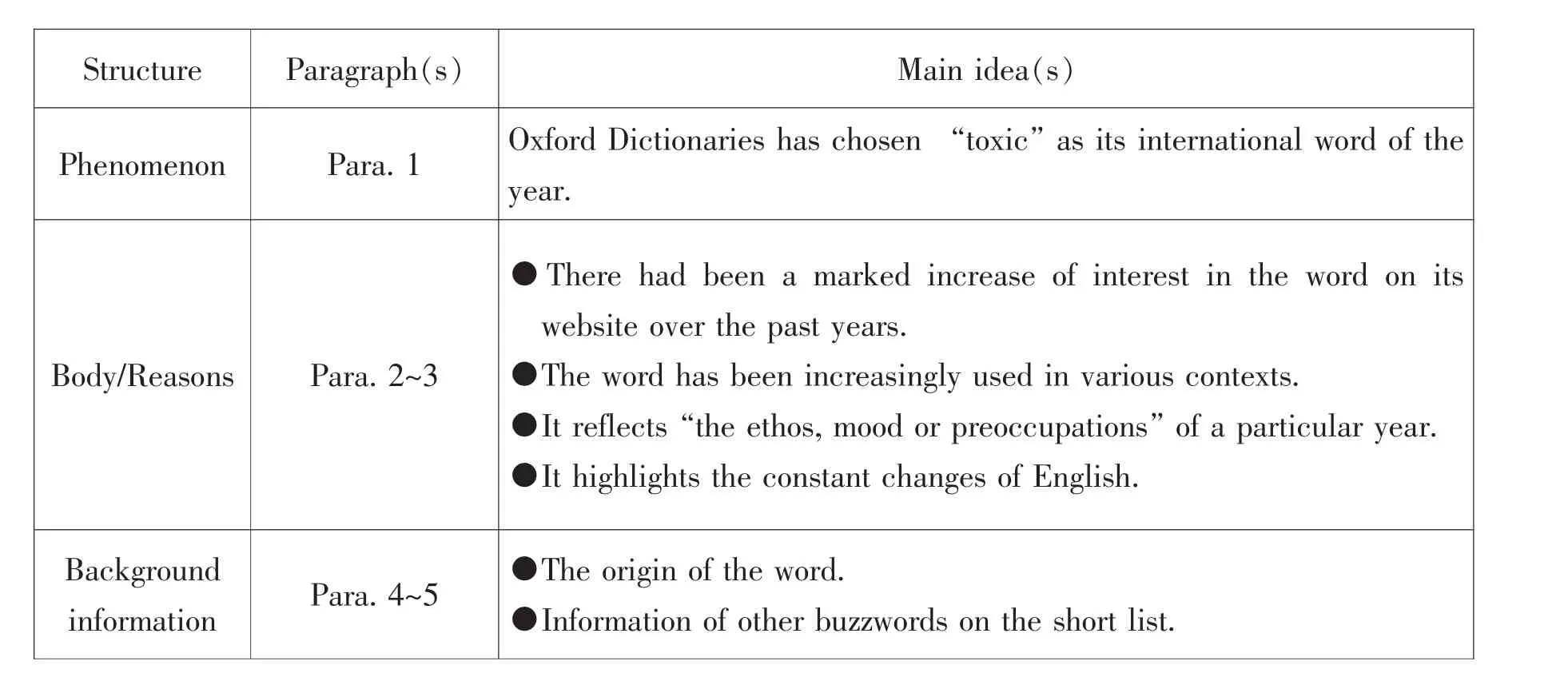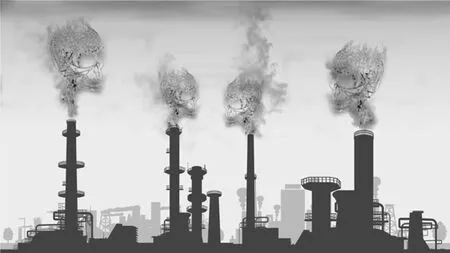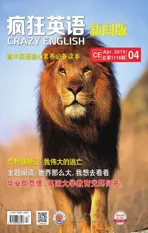2018年有“毒”,我们绝没忽悠你
2019-04-26湖北宜昌天问国际学校
湖北宜昌天问国际学校 王 晶
海词积累
1.contendern.竞争者;争夺者
2.statisticaladj.统计的;统计学的
3.lamentn.挽歌;哀诗;悼词
4.discoursen.演讲
5.masculinityn.男子气概
6.ethosn.(某团体或社会的)道德思想;道德观
7.preoccupationn.长久思考的事情;全神贯注
8.entryn.词条
9.emergev.出现;浮现;露出
10.evolvev.逐步发展
11.involuntarily celibate非自愿独身主义者
预读思考
1.What do you think the word “gaslighting”is likely to mean in the text?
2.Why has Oxford Dictionaries chosen “toxic” as its international word of the year?
3.What is the common structure of a coverage in your eyes?
Oxford Dictionaries has chosen “toxic” as its international word of the year,selecting it from a short list that included such politically inflectedcontendersas “gaslighting” “incel” and“techlash”.

Katherine Connor Martin,the company's head of US dictionaries,said there had been a marked increase of interest in the word on its website over the past years.“But the word was chosen less forstatisticalreasons,” she said, “than for the entire variety of contexts in which it has increased sharply,from conversations about environmental poisons tolamentsabout today's poisonous politicaldiscourseto the#MeToo movement,with its calling out of‘toxic masculinity’.”
Oxford's word of the year is chosen to reflect“theethos,mood orpreoccupations” of a particular year,but also to highlight that English is always changing.Last year's winner was “youthquake”.In 2016,it was “post-truth”.
“Toxic”derives from the Greek“toxikon pharmakon”,meaning“poison for arrows”.The currententryin the online Oxford English Dictionary dates its earliest known printed occurrence to 1664.
Other words on the short list highlight different ways wordsemergeorevolve.While “toxic” is an old and very common word that has expanded in usage, “incel” —short for “involuntarily celibate”—is an example of expressions used by a limited group that suddenly enters widespread usage.And then there's “techlash”,defined as “a strong and widespread negative reaction to the growing power and influence of large technology companies,particularly those based in Silicon Valley”.——FromThe New York Times
文本探究
探究视角1:语篇分析
本文是一篇新闻报道。新闻结构是新闻作品谋篇布局的整体设计,主要组成部分是导语、主体和结尾。新闻报道通常采用“倒金字塔”结构,记者在采写新闻时,要根据内容决定形式的原则,选择最佳的新闻结构去灵活多样地表述新闻内容。本文中的主体部分是toxic一词成为牛津词典年度热词的原因。
文章的篇章结构如下:

S t r u c t u r e P a r a g r a p h(s) M a i n i d e a(s)P h e n o m e n o n P a r a.1 O x f o r d D i c t i o n a r i e s h a s c h o s e n “t o x i c” a s i t s i n t e r n a t i o n a l w o r d o f t h e y e a r.B o d y/R e a s o n s P a r a.2~3 B a c k g r o u n d i n f o r m a t i o n P a r a.4~5 ●T h e o r i g i n o f t h e w o r d.●I n f o r m a t i o n o f o t h e r b u z z w o r d s o n t h e s h o r t l i s t.●T h e r e h a d b e e n a m a r k e d i n c r e a s e o f i n t e r e s t i n t h e w o r d o n i t s w e b s i t e o v e r t h e p a s t y e a r s.●T h e w o r d h a s b e e n i n c r e a s i n g l y u s e d i n v a r i o u s c o n t e x t s.●I t r e f l e c t s“t h e e t h o s,m o o d o r p r e o c c u p a t i o n s”o f a p a r t i c u l a r y e a r.●I t h i g h l i g h t s t h e c o n s t a n t c h a n g e s o f E n g l i s h.
探究视角2:语言学习
Ⅰ.文本填空
1.Oxford Dictionaries has chosen “toxic” as its international word of the year,________(select)it from a short list...
2.Katherine Connor Martin,the company's head of US dictionaries,said there________(be)a marked increase of interest in the word on its website over the past years.
3.“But the word was chosen less for statistical reasons,”she said,“than for the sheer variety of contexts________it has increased sharply...”
4.Oxford's word of the year is chosen_______(reflect) “the ethos,mood or preoccupations”of a particular year.
5.“Toxic”________(起源于)the Greek “toxikon pharmakon”,meaning “poison for arrows”.
6.Other words on the short list highlight different ways_______words emerge or evolve.
Ⅱ.写作推荐
1.介绍新近现象的句子——There have/has been...in/during/over the last/past...
Katherine Connor Martin,the company's head of US dictionaries,said there had been a marked increase of interest in the word on its website over the past years.
该公司的美国版词典负责人凯瑟琳·康纳·马丁说,过去一年中,人们在牛津词典网站上对 “有毒”一词的兴趣明显增加。
本句中由于主句使用了一般过去时said的形式,故宾语从句用了过去完成时。
【仿写】在过去的几年中,中国发生了巨大的变化。
2.巧用现在分词作非谓语动词
“Toxic” derives from the Greek “toxikon pharmakon”,meaning “poison for arrows”.
“有毒”一词源自希腊语中的“toxikon pharmakon”,含义是“箭上的毒药”。
本句中,现在分词meaning引导的分词短语在句中作定语,相当于which means“poison for arrows”现在分词在句中可以作定语和状语,与所修饰的成分构成主谓关系。
【仿写】在中秋节我们吃月饼,这意味着团圆。
探究视角3:文化拓展
漫谈gaslight
《卖拐》《卖车》和《功夫》是赵本山的“忽悠三部曲”,披露出社会上形形色色的行骗者的无耻伎俩以及那些受害者的愚昧无知,意在提醒人们对不法分子提高警惕。标题中的gaslighting源于二战期间的黑白电影Gaslight(《煤气灯下》)。《煤气灯下》是由乔治·库克执导,查尔斯·博耶、英格丽·褒曼、约瑟夫·科顿等主演的惊悚电影,于1944年5月11日在美国上映。该片改编自舞台剧《天使街》,讲述了钢琴师安东为了得到宝拉继承自姑妈的钻石和大笔财产,一面把自己伪装成潇洒而体贴的丈夫,一面又每到夜晚,操控煤气灯使其忽明忽暗,同时使房顶上伴有奇怪的声音,从而企图用心理战术把宝拉逼疯的故事。人性的善良和丑恶在影片中得到了淋漓尽致地表现。
今天,我们常用gaslight一词比喻通过心理暗示操控别人,因此,也就有了“煤气灯操纵法”之说。翻译本文时,我们认真地将其翻译成“忽悠”,可真的没有gaslight各位读者啊。


参考译文
2018年有“毒”,我们绝没忽悠你
牛津词典从一份候选名单中选择了“有毒”作为 2018年度全球热词,该名单上与其相竞争的还有诸如“煤气灯操纵法”“非自愿独身者”和“科技抵制”等颇具政治色彩的词汇。
该公司的美国版词典负责人凯瑟琳·康纳·马丁说,过去一年中,人们在牛津词典网站上对“有毒”一词的兴趣明显增加。但她说,之所以选择这个词,与其说是出于数据统计方面的原因,不如说是因为它在各种各样的语境中大量涌现:从关于环境中有毒物质的讨论、对现今恶毒的政治演讲的哀叹,到指控那些“直男癌”的“#我也是”运动,都与之息息相关。
牛津词典的年度词汇是被挑选出来反映该年的“精神特质、情绪或关注焦点”的,同时也是为了强调英语是一门不断变化的语言。去年的年度词汇是“青年震荡”,而在 2016年,则是“后真相”。
“有毒”一词源自希腊语中的“toxikon pharmakon”,含义是“箭上的毒药”。目前在线牛津英语词典上关于该词条可追溯到1664年,它最早于此年出现在印刷品中。
候选名单上的其他单词突出了单词起源或演变的不同方式。虽然“有毒”是一个古老、很常见且应用语境很广的单词,但“incel”——“非自愿独身者”的缩写,却是一个小群体内行话突然被广泛使用的例子。然后是“科技抵制”,该词被定义成“对科技巨头(尤其是硅谷的公司)日益增长的权力和影响的强烈且广泛的抵制”。

